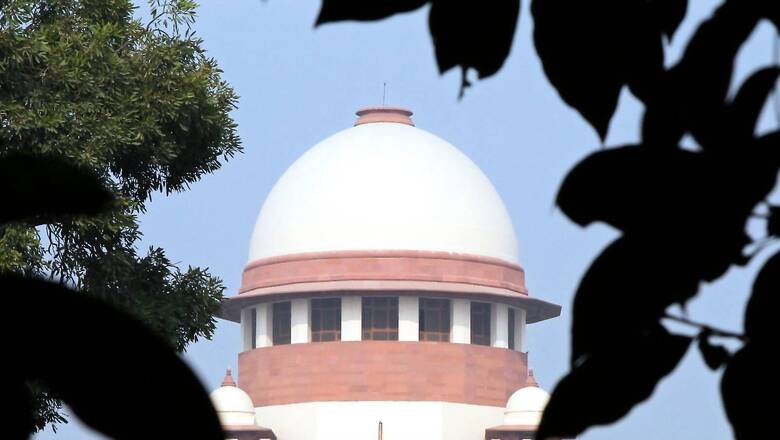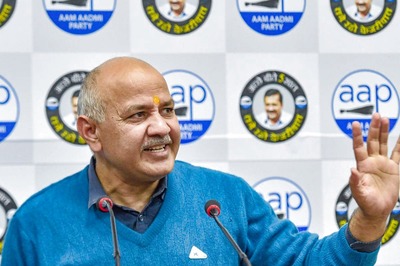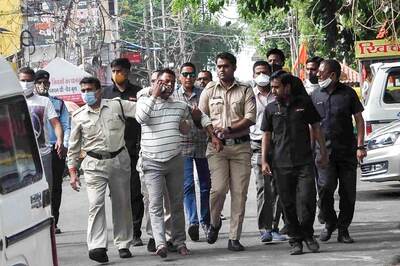
views
The Tamil Nadu government on Thursday favoured in the Supreme Court the pre-mature release of Rajiv Gandhi assassination case convicts Nalini Sriharan and R P Ravichandran, saying its 2018 aid and advice for remission of their life sentence is binding upon the governor.
In two separate affidavits, the Tamil Nadu government told the top court that in the cabinet meeting held on September 9, 2018, it had considered mercy petitions of seven convicts in the Rajiv Gandhi assassination case and resolved to recommend the governor for remission of their life sentences invoking the power granted under Article 161 of the Constitution.
“That the said recommendation in respect of seven life convict petitioners were sent to the then governor of Tamil Nadu individually for approval on September 11 and the same were pending with his office since then,” it said.
Nalini, Santhan, Murugan, AG Perarivalan, Robert Payas, Jayakumar and Ravichandran were sentenced to life term and spent over 23 years in jail.
The state government said, “the law is well settled in the catena of apex court judgments that the governor of a state is bound by the aid and advice given by the council of ministers of a state under Article 161 of the Constitution.”
It referred to the constitution bench verdict of the top court in the Maru Ram versus Union of India (1981 verdict) in which the position with respect to Article 161 of the constitution was authoritatively summed up and said that the action of commutation and release can be pursuant to a governmental decision.
“Thus… it is well settled that though the aid and advice of the state cabinet under Article 161 of the Constitution of India made on September 9, 2018 is undoubtedly binding on the governor of Tamil Nadu as per the 1981 verdict, the release of the writ petitioner (Nalin and Ravichandran) could happen only after the government issue an order to this effect upon approval of the governor thereon,” the affidavit said.
It further said that the law relating to the power of the governor under Article 161 of the Constitution and the power of the state government in dealing with the offences (302 of IPC) falls within the exclusive domain of the state government is also well settled.
The state government said that it is the competent authority to take decision on the petition filed by Nalini and Ravichandran under Article 161 of the Constitution and “the decision of the state cabinet dated September 9, 2018 thereon is final and it can be exercised by governor of Tamil Nadu as per the aid and advice of the cabinet”.
It said that the recommendation of the state government remitting the life sentence of the petitioner was sent to governor of Tamil Nadu for approval on September 11, 2018 and the same was kept pending with his office for more than two and half years and the recommendation was finally forwarded by the governor to the President on January 27, 2021 and it still remain undecided for the past one year and nine months.
Both Nalini and Ravichandran have been on ordinary leave (parole) from December 27, 2021 till date as sanctioned by the Tamil Nadu government under the Tamil Nadu Suspension of Sentence Rules, 1982 then and there based on their request. Nalini has been incarcerated in special prison for women, Vellor for the past 30 years 04 months while Ravichandran is lodged in Madurai, Central Prison and has undergone 29 years of actual imprisonment and 37 years of imprisonment including remission.
On September 26, the top court had sought replies from the Centre and the Tamil Nadu government on a plea filed by Nalini Sriharan and Ravichandran seeking premature release.
Both of them have challenged the June 17 order of the Madras High Court, which rejected their pleas for early release, and cited the apex court judgement ordering the release of co-convict A G Perarivalan. The high court had on June 17 rejected the petitions of Nalini and Ravichandran, to order their release without even the consent of the state’s governor.
The high courts do not have the power under Article 226 of the Constitution to do so, unlike the Supreme Court which enjoyed the special power under Article 142, the high court had said while rejecting their pleas. Invoking its extraordinary power under Article 142 of the Constitution, the top court had on May 18 ordered the release of Perarivalan, who had served over 30 years in jail, and said the Tamil Nadu governor ought not to have sent the “binding” advice made by the state cabinet for his release to the president.
The apex court had said the advice of the state cabinet is binding on the governor in matters related to commutation/remission of sentences under Article 161 of the Constitution. Under article 142, the top court may issue any verdict or order necessary to provide “complete justice”.
Gandhi was assassinated on the night of May 21, 1991 at Sriperumbudur in Tamil Nadu by a woman suicide bomber, identified as Dhanu, at a poll rally. In its May 1999 order, the top court had upheld the death sentence of four convicts Perarivalan, Murugan, Santhan and Nalini.
However, in 2014, it commuted the death sentence of Perarivalan to life imprisonment along with those of Santhan and Murugan on grounds of delay in deciding their mercy petitions. Nalini’s death sentence was commuted to life imprisonment in 2001 on the consideration that she has a daughter.
Read all the Latest News India and Breaking News here




















Comments
0 comment